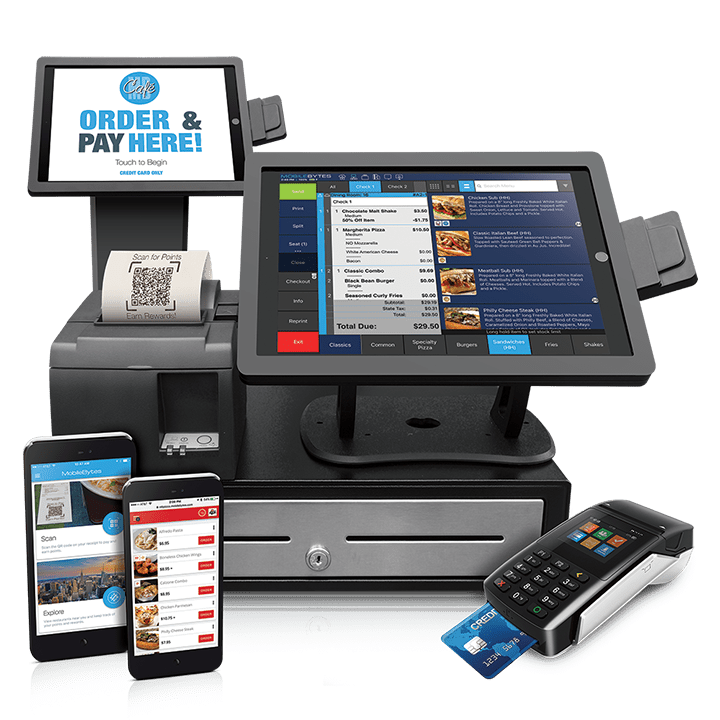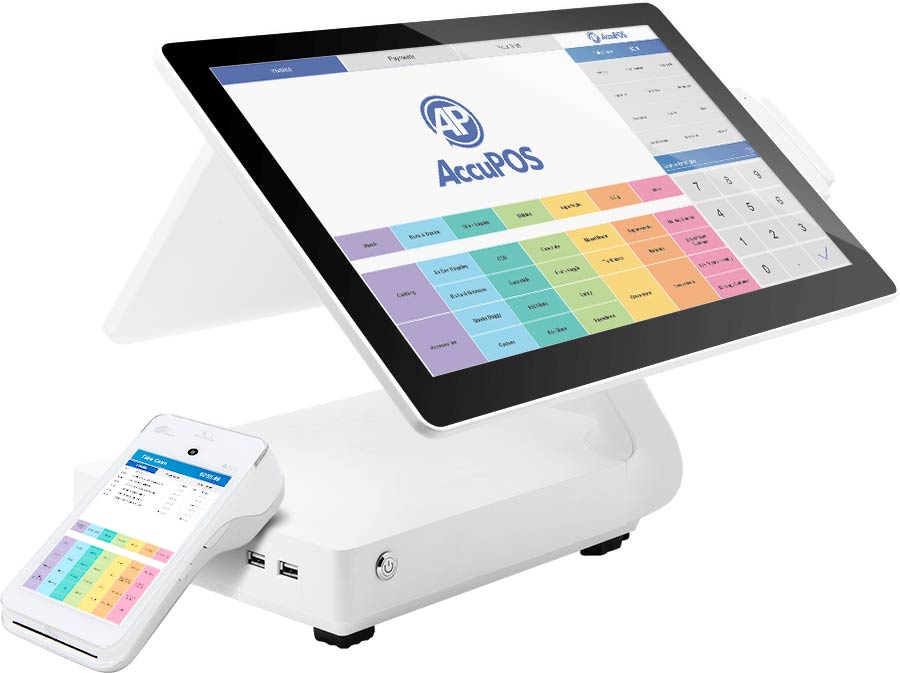What Does Pos System For Small Business Do?
What Does Pos System For Small Business Do?
Blog Article
All About Restaurant Pos

POS Software: Retail Point-Of-Sale Solutions Streamline Deals
All About Point Of Sale Systems

Hardware Components of a Point of Sale System What makes a POS system tick? It's not simply software application; the hardware plays a starring function. Think of it as the body to the software application's brain. Without the best hardware, even the most sophisticated POS software application is simply a pretty face. Essential POS Hardware So, what are the must-haves? Let's simplify. The main processing unit, typically a computer system or tablet, is the heart of more info the operation. The display or touchscreen display permits staff to interact with the system. A barcode scanner speeds up the checkout procedure. Keep in mind the days of manually getting in each code? The trusty invoice printer supplies consumers with a record of their purchase. A money drawer keeps your money safe and arranged. A card reader permits customers to pay with credit or debit cards. Diving Deeper: Beyond the Basics But wait, there's more! Depending on your service, you may require specific hardware. For example, a dining establishment might integrate kitchen printers to relay orders, while a store may use label printers for product tagging. Ever question how your local bakeshop immediately prints those delicious-looking labels? Choosing the Right Hardware: A Balancing Act Choosing the best hardware isn't practically buying the most expensive equipment. It's about finding the sweet area in between performance, resilience, and budget. A small service simply starting out may choose for a more fundamental setup, while a high-volume merchant will require robust, high-performance machines. Is it much better to buy new or used? Consider your alternatives carefully. A brand-new system provides the most current innovation and warranty protection, however a refurbished system can conserve you money. The Future of POS Hardware What does the future hold? Expect to see even more integration with mobile devices, biometric scanners for employee authentication, and advanced analytics control panels showed on larger, clearer screens. Think of a world where inventory is immediately updated in real-time as items are scanned-- a world where you can track your very popular product from anywhere in the world. The possibilities are unlimited, and the hardware is continuously progressing to satisfy the needs of today's services. Are you all set to update your point of sale system?
Software Application Features and Capabilities: The Heart of Your POS System
Ever view a skilled barista slide through a hectic early morning rush? Their secret isn't just caffeine; it's a smooth dance with their POS system. The software is the conductor of your business symphony, orchestrating everything from sales to inventory. But what notes should you be listening for? What capabilities truly matter in today's market?
Inventory Management: Beyond Counting Beans
Forget spreadsheets that haunt your dreams. Modern POS systems provide real-time inventory tracking, alerting you when your stock of artisanal coffee beans dips precariously low. Believe of it as a digital guardian angel, preventing those awkward "Sorry, we're out!" minutes to customers. What if you could also forecast need based on historic information? Numerous systems now provide forecasting tools, an effective weapon against overstocking and lost sales. This assists avoid the circumstance of running out of popular products or building up excess inventory of slow-moving products, both of which can constrain money circulation and area.
Sales Reporting and Analytics: Translating the Information
Sales data is the brand-new gold, and your POS system is the miner. Forget just understanding just how much you sold today. Dive deep into the information to discover trends, recognize your very popular products, and understand client behavior. Which menu product pairs perfectly with the daily special? Which promotion resonated most with your customers? These insights are not simply intriguing; they're actionable intelligence. Without reliable sales reporting, navigating the complexities of business decision-making ends up being like cruising without a compass, increasing the opportunity of bad moves and missed out on chances.
Customer Relationship Management (CRM): Structure Bridges, Not Walls
Keeping in mind a regular consumer's name and favorite order is captivating, however scaling that personal touch is tricky. POS systems with CRM abilities enable you to track client purchase history, choices, and even birthdays. Think of automatically providing a discount on their birthday-- a little gesture that fosters loyalty and motivates repeat organization. However there is the possible snag of bad data quality, which can cause incorrect client profiles and inefficient marketing efforts.
Payment Processing: Improving the Transaction
The checkout experience can make or break a sale. Seamless integration with various payment techniques-- charge card, mobile wallets, even copyright-- is non-negotiable. Can your system deal with split payments? Does it offer safe and secure tokenization to protect client data? A clunky payment process is like striking a sour note in your company symphony, potentially disrupting the whole efficiency. Ensuring compatibility with evolving payment technologies and adherence to security standards are vital for maintaining customer trust and functional efficiency.
Staff Member Management: Keeping the Team in Sync
From clocking in and out to handling approvals and tracking efficiency, staff member management includes simplify operations and improve responsibility. Is scheduling a headache? Lots of POS systems use integrated scheduling tools, optimizing staffing levels based on predicted need. A typical obstacle that is typically ignored is the obstacle of incorporating employee management functionalities with payroll systems, which can result in mistakes and ineffectiveness in wage estimations.
Advanced Characteristics: Leveling Up Your Operations
- Table Management: Ideal for dining establishments, this function enables you to imagine your dining-room, track table status, and manage reservations.
- Commitment Programs: Reward your best customers and motivate repeat organization with integrated loyalty programs.
- Online Ordering Integration: Seamlessly incorporate your POS system with online purchasing platforms to broaden your reach.
Choosing the best POS system is about more than simply functionality; it's about discovering a partner that can grow with your organization. Consider your existing requirements, prepare for future growth, and don't be scared to ask the hard concerns. The right software can transform your service from a chaotic cacophony into an unified work of art.
Industry-Specific POS System Applications
Think about the local bakery, bustling with early morning consumers yearning fresh croissants. A generic POS system might manage deals, but can it manage complex dishes, track active ingredient inventory, or immediately adjust production schedules based on sales data? Probably not. That is where the beauty of industry-specific POS systems shines.
Dining establishments and Hospitality
For busy restaurants, speed and precision are paramount. How lots of times have you seen servers managing orders, modifications, and splitting expenses, all while attempting to supply outstanding service? A restaurant POS system improves these processes, permitting table management, kitchen order tickets, and even online ordering integration. These systems frequently include functions like ingredient-level inventory tracking, crucial for managing food expenses and decreasing waste. Ever question why your favorite dish is in some cases not available? It might come from an absence of correct stock management.
- Table Management
- Cooking Area Order Tickets
- Online Buying Integration
- Ingredient-Level Inventory Tracking
Retail Solutions
Retail, with its diverse stock and client interactions, demands a different set of tools. Imagine a shop clothing store struggling to monitor sizes, colors, and seasonal collections using a standard checkout system. An industry-specific retail POS system offers features like barcode scanning, client loyalty programs, and in-depth sales reporting. These systems can even incorporate with e-commerce platforms, supplying a seamless omnichannel experience for clients. Did you know some retail POS systems can predict future sales patterns based on historical information? Now that is powerful!
The Dangers of a Mismatch
Picking the wrong POS system can produce significant functional hurdles. A clothes store using a dining establishment POS, for instance, would find it unsuitable for managing inventory with sizes and colors. The absence of proper reporting and analytics might result in misinformed buying decisions and lost revenue. The outcome could be comparable to attempting to fit a square peg in a round hole.
Secret Considerations
Choosing an industry-specific POS system requires careful evaluation. Consider your service's distinct requirements and functional workflows. Does the system integrate with existing software application? Does it provide the necessary reporting capabilities? Is it scalable to accommodate future development? A well-chosen POS system is not just a transaction tool; it's a strategic asset that can drive effectiveness, improve consumer satisfaction, and ultimately, boost your bottom line. Remember, it is an investment in your business's future, not just a cost.
Security Considerations for Point of Sale Systems
Ever heard the tale of the mom-and-pop shop that lost everything because of a single, neglected security flaw in their POS system!.?. !? It's a cautionary tale, and it highlights a critical element typically eclipsed by the attraction of expensive functions and streamlined operations. The truth is, a POS system is just as excellent as its security. What excellent is a system that crunches numbers in a flash if it enables lawbreakers to swipe consumer's data just as rapidly?
The Vulnerability Minefield
The digital landscape is a battlefield. Every POS system, no matter size or elegance, is a possible target. Are you really prepared for the hazards lurking around the corner? The real pinch comes when you find that your out-of-date software application has an open hole that hackers can make use of, turning your service into an unwitting accomplice in identity theft. The trouble is that hackers are crafty and are always altering their strategies.
Common Security Spaces and Professional Tips
- Weak Passwords: "Password123" isn't cutting it. Use strong, unique passwords for all POS system accounts and alter them regularly. Two-factor authentication is a must.
- Unsecured Networks: Your Wi-Fi is like leaving the front door open. Protect your network with strong encryption (WPA3 if possible) and consider a different network for your POS system.
- Out-of-date Software Application: Software application vendors patch security holes all the time. Failing to update resembles inviting problem. Set up automated updates or schedule routine upkeep.
- Worker Training: Your staff is your very first line of defense. Train them to acknowledge phishing efforts, protect passwords, and report suspicious activity.
Information File Encryption: Your Guard Against the Dark Arts
Think of data encryption as a secret code. It scrambles delicate information, like charge card numbers, making it unreadable to unauthorized users. Without encryption, your clients' financial information resemble sitting ducks, ripe for the picking by cybercriminals. It's not just about safeguarding your customers; it's about protecting your credibility and avoiding substantial fines.
PCI Compliance: The Rulebook You Can't Disregard
If you accept charge card, you're bound by the Payment Card Industry Data Security Requirement (PCI DSS) It's a set of security requirements designed to protect cardholder data. Failing to comply can result in fines, charges, and even the loss of your capability to process charge card payments. It's a headache, yes, however it's an essential one. Think about PCI compliance as the expense of doing service in the digital age.
Consider this: every deal processed through your point of sale is a prospective entry point for destructive actors. By executing robust security procedures, you're not just protecting your service; you're safeguarding your consumers' trust and guaranteeing the long-term practicality of your operations. The security of your POS system isn't just a technical issue; it's an organization necessary. It requires constant vigilance, proactive procedures, and a commitment to remaining ahead of the curve.